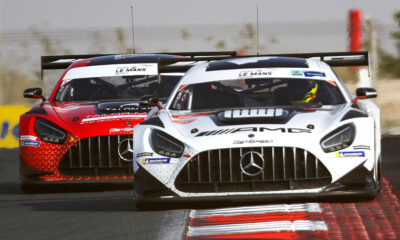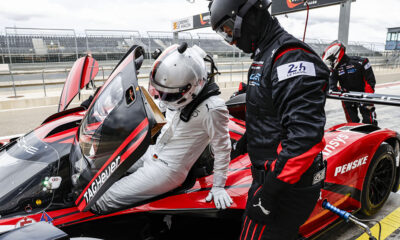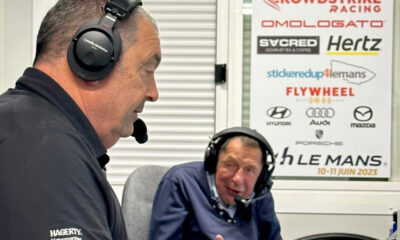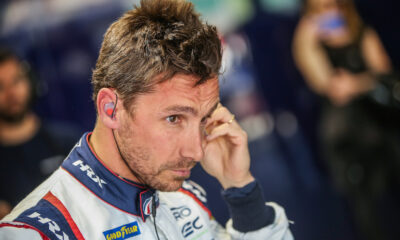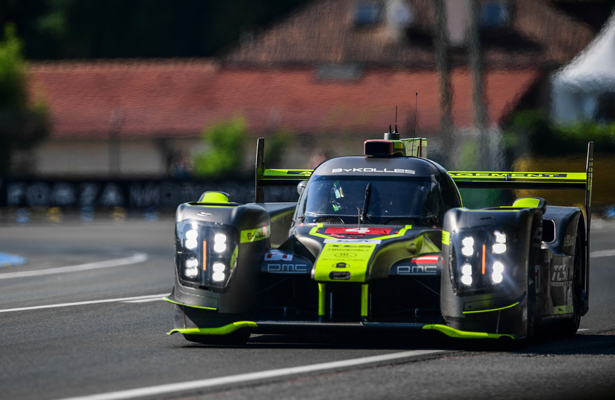
Photo: Vision Sport Agency
ByKolles Racing Director of Operations Boris Bermes has admitted the 24 Hours of Le Mans could have been the team’s “big moment” in capitalizing on the issues that hit all of the LMP1 hybrids to have potentially pulled off an upset overall victory or podium finish in the attrition-filled race.
The German squad’s ENSO CLM P1/01 NISMO, the only LMP1 Privateer car in the field, was the first retirement, after debris collected on the opening lap by Oliver Webb caused the engine to overheat.
While it wasn’t apparent at the time of ByKolles’ race-ending issue, each of the LMP1 hybrids from Toyota and Porsche would subsequently hit trouble, with two Toyotas TS050 Hybrids and the No. 1 Porsche 919 Hybrid retiring, which put the No. 38 Jackie Chan DC Racing Oreca 07 Gibson — a LMP2 car — into the overall lead with less than four hours to go.
The No. 2 Porsche of Brendon Hartley, Timo Bernhard and Earl Bamber, which spent 65 minutes in the garage due to a front motor generator unit failure in the third hour, fought back from a 19-lap deficit to take the win, but just one lap ahead of the LMP2 class-winning, and second place overall finishing Oreca.
Had the ByKolles entry completed the race without any major issues, and was able to match its 3:24 lap pace from qualifying, Webb and co-drivers Dominik Kraihamer and Marco Bonanomi would have likely been standing on the top step of the podium.
“‘What would have been if…’ I had these thoughts just as often as our drivers and many other observers,” Bermes said. “Unfortunately, it is pointless to occupy yourself with such theories.”
Despite Webb’s 3:24.170 time in qualifying, that marked the fastest-ever lap by a current-generation LMP1 non-hybrid car at Le Mans, Bermes said they could have gone considerably quicker, had it not been for unforeseen “reliability” issues that struck the small team early in the race week and resulted in a change of strategy.
According to Bermes, the issues were not present in the opening two FIA World Endurance Championship rounds, including at Spa, where it scored a series-best sixth place overall finish, ahead of the entire LMP2 field, in a trouble-free run.
“Under normal operating conditions during the race, our ENSO CLM P1/01 would have been capable of lap times around 3:23/3:24 minutes,” Bermes said. “During qualifying, unfortunately, we were only able to do single timed laps on which we incurred a lot of traffic, thus losing a lot of valuable testing time.
“Lap times in the area of 3:21/22 would have been absolutely realistic. The car was improved 12 seconds compared to last year. We have never been so close to the manufacturers and their LMP1 Hybrid cars.
“Taking into account the numerous problems the manufacturers encountered, it could have been our big moment.”
While left to think about the “what ifs” Bermes said the crew is more motivated than ever to put in a strong result in next month’s Six Hours of Nürburgring, which is likely to be its final race of the season.
“Of course, the disappointment over the failures with this big chance in mind was big, nevertheless we take the positive impressions and continue our consistent work,” he said.
“Already at the upcoming six-hour WEC race at the Nürburgring, we want to turn the full potential of the car in a top result. Now more than ever.”
James Rossiter, who was forced out of Le Mans due to his Super GT commitments, is expected to return to the team alongside Webb and Kraihamer.


















